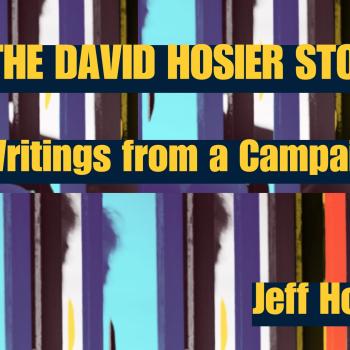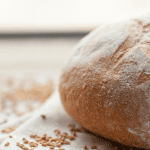The Adventurous Lectionary – The Twelfth Sunday after Pentecost – August 11, 2024
2 Samuel 8:5-9, 15, 31-33
Psalm 130
Ephesians 4:25-5:2
John 6:35, 41-51
Today’s passages join challenge, hope, and grief. They join deep emotion with deep faith. We often live in the depths, feeling God-forsaken. They also counsel behaviors that edify rather than tear down, which is especially important in this time of vitriol and incivility, in which politicians thrive on dishonesty and divisiveness. Even with the best intentions, our own behaviors lead to alienation and brokenness in our personal and national lives. We may have to repent of the evils we’ve caused and the impact of our actions on future generations. Words can harm as well as heal. Yet, even in the depths we are challenged (by the words of Ephesians) to imitate God and, perhaps, in the process discover the everlasting nourishment of divine compassion and creativity.
Even for a good cause, such as preserving the nation, tragedy and violence tear apart human life. War is hell and there are always unintended as well as evil consequences even for the best of causes, to preserve the unison. David wants to spare his third son Absalom from death, despite his treasonous behavior, and find some way to restore his place in the nation, but Absalom is slaughtered by David’s troops. The underlying implication of this saga is that David’s affair leads to Absalom’s revolt and eventually the death of David’s third son, described as the most handsome in the kingdom. While I do not believe in linear and unilateral divine action, there is something karmic about the events that lead to Absalom’s death. David’s murder of Uriah to cover up his affair with Bathsheba leads to insurrection and death. David’s immorality is national as well as personal just as our leaders’ immorality can lead to disastrous future consequences.
David’s grief is inconsolable; he wishes it was him rather than his beloved child. The loss of a child, regardless of the circumstances is devastating. Even a wayward child can be the apple of her or his parents’ eyes, and as scripture notes, the loving parent rushes to welcome every prodigal child home and is willing to face humiliation and ridicule to restore his dissolute child back to the fold.
Today’s scripture begs the question, for what do we need to repent individually or nationally? I ponder the long-term consequences of our nation’s traumatization of children separated intentionally and punitively from their parents to protect our borders or the cries, after proven otherwise, that the 2020 election was rigged. Our leaders intended harm and made no provisions for reuniting families in trying to solve the border crisis and Christians continue to justify such inhumane treatment, praise a politician who promises to be their retribution, and embrace lies and denounce fact. We have been weighed in the ethical balances and have been found lacking. We have no idea what future tragedies will result from our national inhospitality to immigrants and fixation on power and prejudice, privileging the worse rather than better angels of our nature.
Psalm 130 also speaks of loss and grief, perhaps occasioned by the Psalmist’s own misdeeds. “Out of the depths” cries out the Psalmist, feeling himself almost beyond divine care as a result of his plight. As a result of his iniquities, God seems absent. The Psalmist confesses that no one, even the best of us, can stand before God. Our goodness is as filthy rags, our righteousness wavering, and all have sinned and fallen short. We hope for healing and restoration but cannot assume it; all is lost so it seems and all we can do is wait till the storm passes, the silence ends, and God becomes real to us.
Psalm 130 notes that regardless of how far we have fallen, God’s mercy will prevail at the end of the day. There is a grace greater than our sin that enables us to begin again. We will never be the same – healing does not nullify our pain and brokenness – but perhaps our lives will be more attuned with God’s vision as a result of our recognition of our needs and God’s ever-abiding love. We may experience a new orientation in which the “wreckage” (Alfred North Whitehead) of our lives is transformed by divine grace. But, in the meantime, we must “wait” in all our hope and hopelessness for God to lead us back to the pathways of healing.
The reading from Ephesians challenges us to be imitators of God. God calls us to become like God in our large-spirited approach to life, forgiveness, wisdom, and fairness. We are challenged to be imitators of God; to be large spirited, forgiving, wise, and fair. Having received grace beyond our wildest imaginings, let us be graceful. Let us live in love, making our lives a sacrifice, a gift to God; the greatest gift we can make to God is a holy and loving life.
Our lives matter to God and the quality of our lives contributes or detracts from the beauty of the world and the well-being of others. When we imitate God’s way, we have a new set of values, contrary to our culture’s values, and become God’s agents of Shalom. God privileges love not hate, honesty not falsehood, unity not division, humility not hubris, affirmation and not denunciation and expects these behaviors from us at home, at church, and in politics.
John’s Gospel proclaims that Jesus gives us bread of life, an eternal nourishment that outlasts death and destruction. In fact, Jesus is the bread of life, that is, the energy and spiritual nourishment of Jesus feeds us in the same way that good bread satisfies our physical hungers. Jesus is not an external reality, but the deep nurturing power that gives life to all creation, especially to those who know their need. We need this bread of heaven, coming solely by the grace of God.
This bread is available to all people, but we may be oblivious to the nourishment God is constantly providing in terms of possibilities and the energy to experience life’s holy abundance. Could we, like the person in the poem “Footprints,” be receiving this bread even in our darkest moments. Although we may not notice it, we are always receiving sustaining grace, more than we can ask or imagine. In all our imperfection and waywardness, God remains faithful, ready to forgive and heal. Thanks be to God!
+++
Bruce Epperly is a professor, seminary administrator, pastor, spiritual guide, and author of over 80 books, including “Jesus: Mystic, Healer, and Prophet,” “The Elephant is Running: Process and Open and Relational Theology and Religious Pluralism,” and “The God of Tomorrow: Whitehead and Teilhard on Metaphysics, Mysticism, and Mission.’














